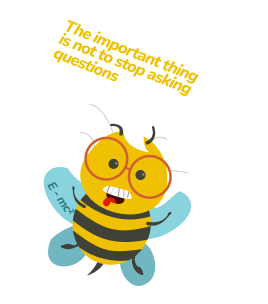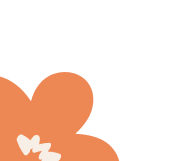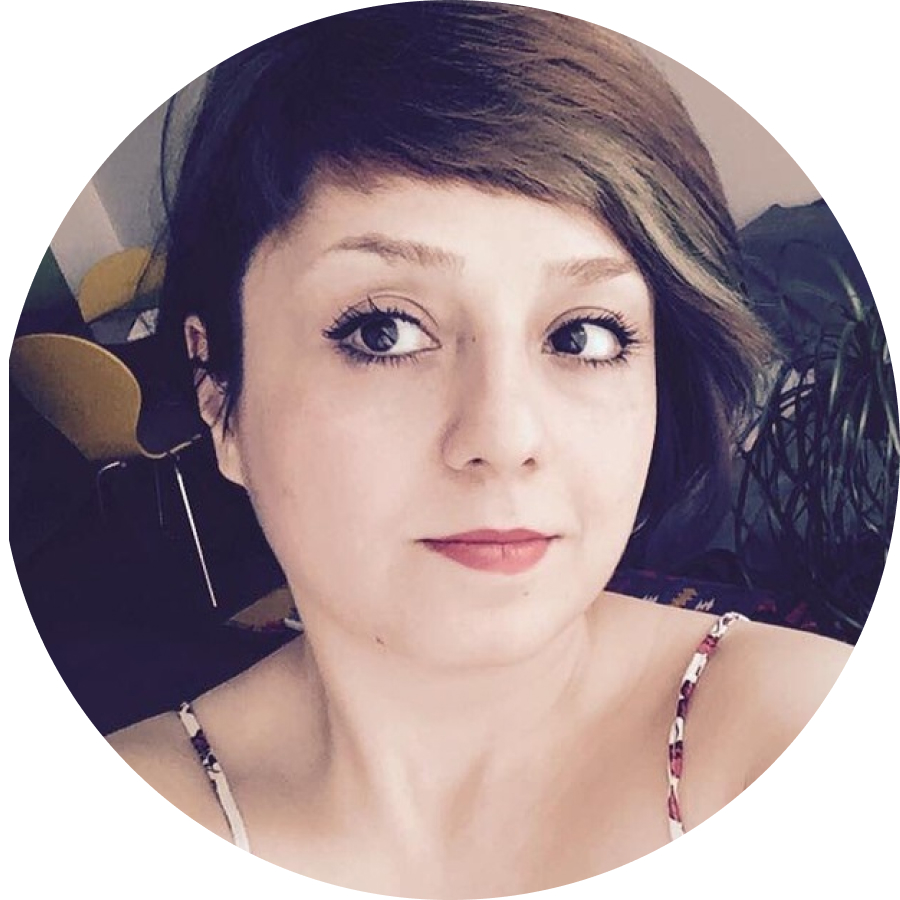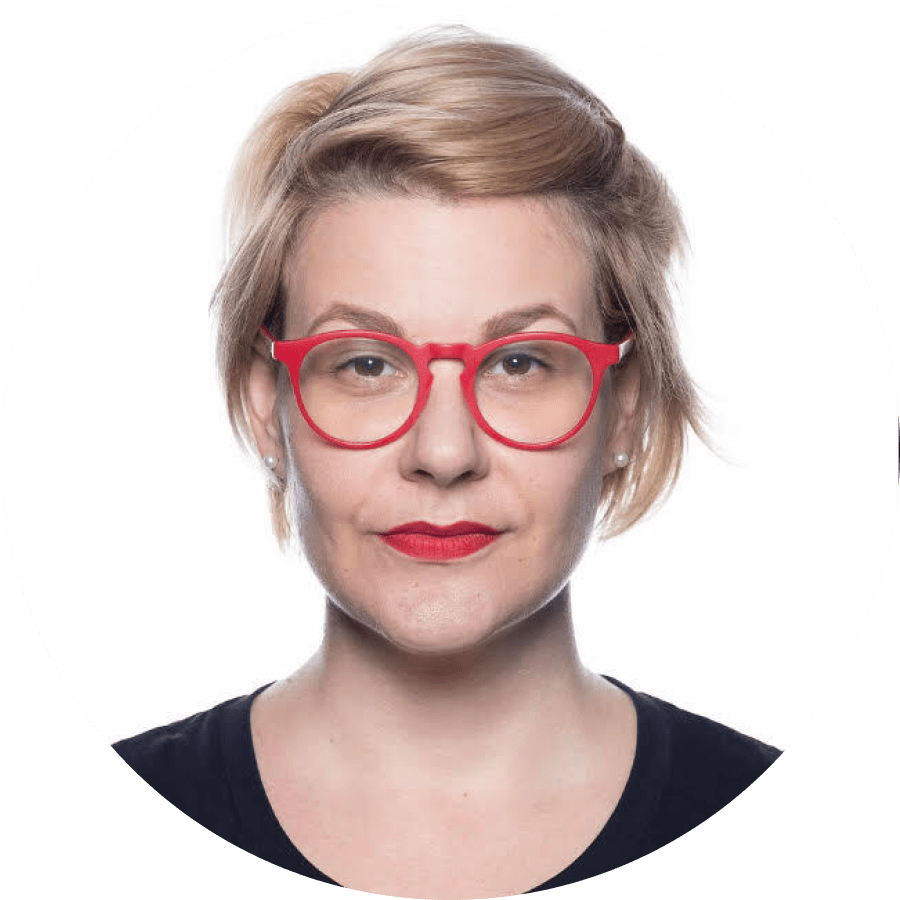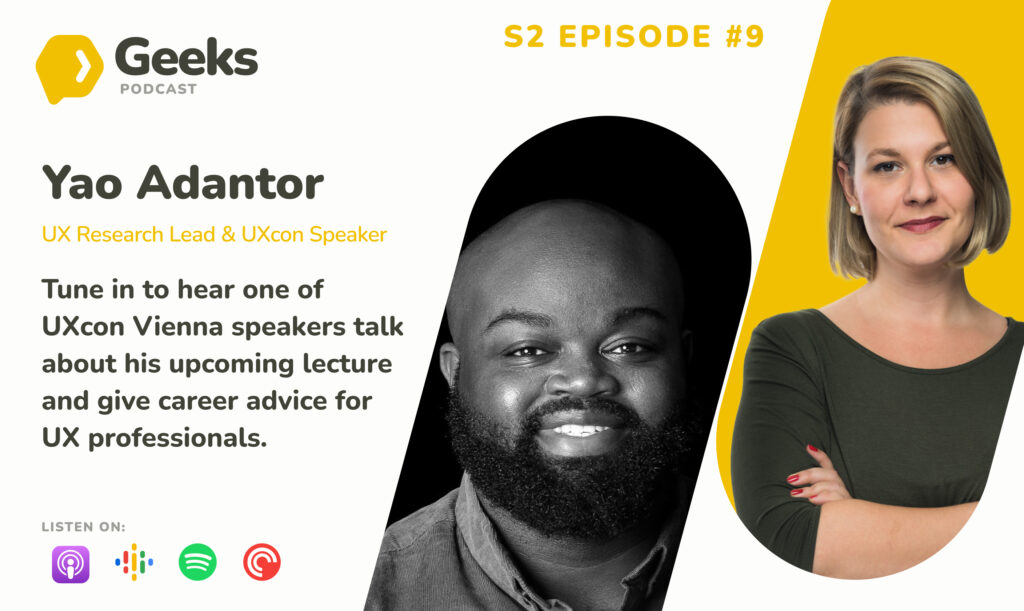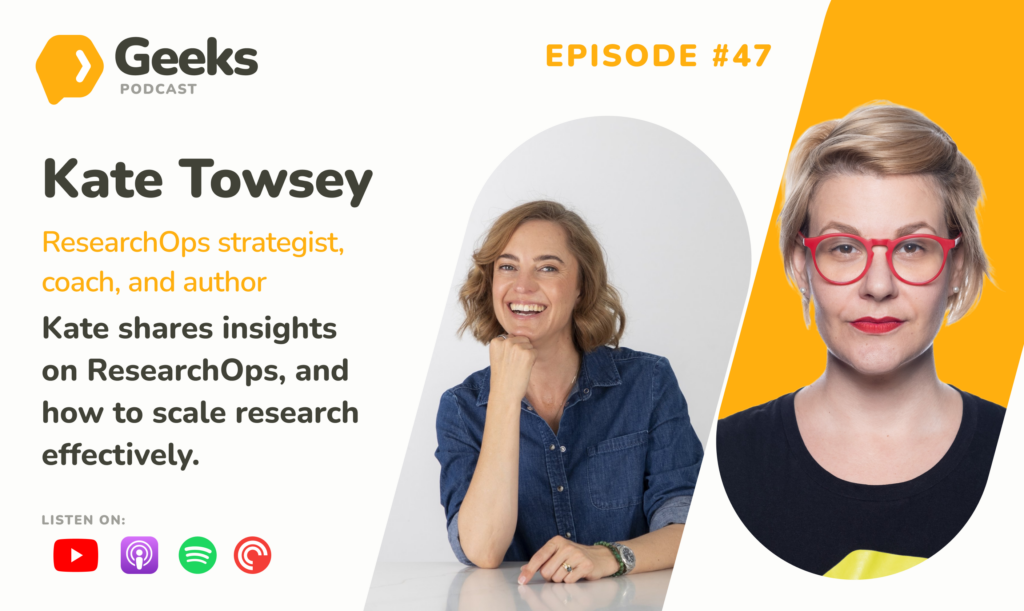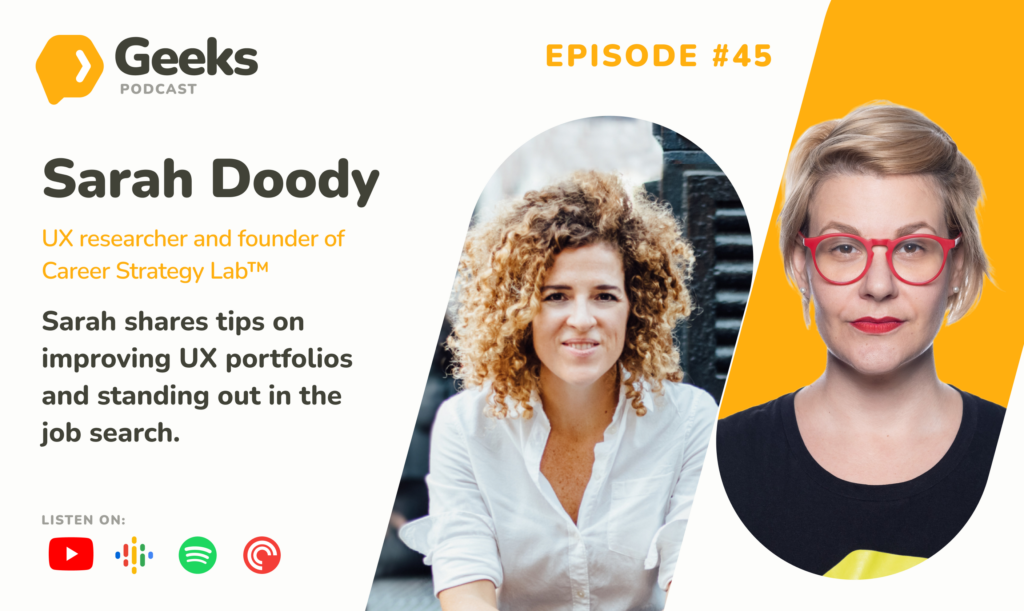In this episode of UX Research Geeks, we engage in discussions with Elham Mohtashamzadeh, a researcher at Central European University. Elham explores the nuances of sex and gender, addressing topics such as heteronormative social constructs and the influence of capitalism on our perception of gender.
Episode highlights
[00:01:10] Challenges Faced in Iran
[00:10:21] Changing Perspectives on Gender
[00:27:30] Fluidity of Gender and Non-binary Identities
[00:41:16] Advocating for Inclusivity
[00:44:29] Connecting with Elham Mohtashamzadeh
About our guest Elham Mohtashamzadeh
Elham Mohtashamzadeh is a researcher specializing in gender studies, sociology, and film studies, with a strong focus on women’s social movements, women’s rights, and LGBTQ+ issues in the Middle East, notably in Iran. With nearly 15 years of experience in teaching, Elham is highly skilled in educational roles and possesses valuable expertise in office administrative positions. She thrives in collaborative team environments and excels in problem-solving scenarios, having collaborated with various sales companies and educational institutions throughout her career. You can connect with her on LinkedIn to learn more about her work and contributions.
Podcast transcript
[00:00:00] Tina Ličková:
Welcome to UX Research Geeks, where we geek out with researchers from all around the world on topics they are passionate about. I’m your host Tina Ličková, a researcher and a strategist, and this podcast is brought to you by UXtweak, an all-in-one UX research tool.
Hi Ellie!
[00:00:31] Elham Mohtashamzadeh: Hi, how are you?
[00:00:32] Tina Ličková: Good. How are you?
[00:00:34] Elham Mohtashamzadeh: Thank you. I’m great.
[00:00:35] Tina Ličková: Ellie, maybe you will say you are not, but for me, you are an expert on gender studies. You are a researcher and just finished your master’s at the Central European University in Gender Studies. And that’s why I invited you, because we had a lot of interesting discussions on gender. And I wanted to give also user researchers a possibility to look at it from a more theoretical side. The first question will really be, so you have opportunities to talk about yourself, who are you?
What are you doing? Why did you decide for gender studies? That’s also really interesting.
[00:01:10] Elham Mohtashamzadeh: Yeah it’s a wonderful question because I always love to talk about it.
You know that I’m Iranian, so I’m from Iran and the situation of women in Iran is A lot of people may know, which also means, I spent most of my time, most of my life there. So I, from the early times living in, I was like, because of my mom, I was really sensitive to women’s problems and issues.
And later on, because of my own family, it wasn’t a religious family. So we had. I was free as a woman. The contrast between what I had to be in public and what I was in private space, it was problematic for me. I couldn’t digest it. Sometimes it was heavy for me, especially me as a teenager.
Also in relationships with other people. The concept of the opposite sex was Freeing my own family, like a kind of normal relationship with your cousins, like everyone in the family, like within the family. But it was very strange outside because then outside you had to explain for police officers, for anybody who you two are, like, what is the relationship between you two?
And it was strange for me. And it’s also other stuff. When it came to women’s hijab and in public spaces, it was so extreme in the beginning of the Islamic revolution in 1979, it was too extreme for a lot of people. And, I was born in 1979, so it was a coincidence of the Islamic revolution and my birth.
And then as I was growing up, I was growing up with the revolution itself. So I observed a lot of things as a child of the revolution. I was really sensitive because my mom was a strong woman. She’s a strong woman. And she was independent financially and emotionally. And it was, I was looking at her and I was asking myself that, okay.
What about other women? Do other women have these possibilities and, like family privileges? Because I come from a middle class family and I was asking myself, if all the women out there have the same opportunities to talk about stuff, to have the access to all the resources, education, job, even the freedom of talking about different things with your family.
I’m not saying that my family was perfect. Of course not. We had an average middle class family where you could at least exchange a lot of problems and a lot of things and issues with your parents. And it was a privilege to me, like it’s something that I appreciate.
In high school, through my education, I realized that I’m really sensitive to those issues. It wasn’t just about me. I was sensitive about something that could happen to others. And I was observing that and I was reacting to this and many times I would have been told like, it’s not your problem.
It’s not happening to you. Why are you reacting? Even my parents were really worried about me. Why are you reacting in the streets to somebody who, especially the police forces regarding your job and also, about Things that happen to a woman, like in the streets of Iran, especially at that time, because now it’s like the situation is far different than that time.
Then, okay, I wanted to study something. I was into arts a lot, and I wanted to do something related to film and cinema, because I was really interested in cinema, but at the same time very interested in humanities and philosophy and history. And I was lost at some point, but then I had a really good friend who navigated me through what I really wanted to do.
Then I, of course, studied graphics and then I… I went to a lot of film schools and like people who were doing films, still, something was still missing. And it was like women in spaceships. And I had the brilliant opportunity to get to know one of the very smart Peruvian persons in Iran who was concentrating on feminism and arts.
We have a secret course with like almost 40 people and it was secret courses in an institution, an art institution, because if any of the government officials would know, we would have been stopped. We were like, every Tuesday we used to go there and we used to talk about feminism and arts and that was the place I started to get to know a lot of literature related to feminism and gender, but not in a detailed way, but like a general frame or general body of literature related to feminism and arts.
From then, I was like, okay, that’s exactly what I wanted and I want to study this field. It wasn’t easy because I was coming from art and I, like anyone, it wasn’t really possible in Europe. It’s not really possible from one field to the other field. So I got accepted for my first master’s in because I was in love with Eastern European cinema.
So I went to Hungary to study film studies and filmmaking for my master’s. And I wrote my thesis on women’s representation in Iranian cinema from a feminist perspective. And that was the point that I was like, okay, I was really happy that I could actually work on women’s issues, practically and academically.
And then after that, I got to know CEU because at that time it was in Budapest and it was an amazing university. Many of my friends, Hungarian and non Hungarians, were coming from this university, very intellectual people, very interesting. And then I went to a lot of public events and I got to know a lot of professors there and they really, they were interested in my country and the situation I’m in there and they realized that I’m really interested and then invited me, why don’t you apply?
And then I applied and I got accepted. And since then, my life has changed a lot because I have the chance to be in an environment where you could read a lot of stuff, be with people who really care about these things. It’s not just about academia. It’s a supporting community of people who really care about each other.
Who really care about, politically care about what’s happening out there. Which was always missing for me in academia. Because it was like, okay, it’s just an academic bubble where you study things, where you learn things. But nobody cares about what is happening out there. Like outside academia, and it was something that I learned in, and I really appreciate and see you because see you people really care about what is happening to people and they have a side and they, they express themselves and we have a good community when we get together.
So it matters to me. It’s a different university in that sense. I really love, especially our department in general, the university itself, politically speaking. Yeah, so that was the story. And then, I wrote my master’s degree thesis on social movements of Iranian women and activism of Iranian people.
Iranian women, sorry, with the concentration of collective identity which has been my focus recently, and I care about it a lot, because when you think about any social change, you have to think about collective, any sort of collective that could happen, that could be constructed especially among women, because I do care about women’s movements. And because of the situation in Iran, it has been really complicated because any sort of collective is definitely stopped, is definitely deconstructed, and is definitely destroyed by the officials. And the recent social movement that happened in Iran, which was amazing in 2018, I wrote my thesis on it.
It was one of the most amazing protests that has happened so far in Iran. And I wrote my thesis on it, and I’m going to continue, I’m working on it for my Ph. D. Because I recently accepted a Ph. D. in Sociology and Cultural Studies. Which… Will direct me towards the more sociological side of it because now I have a gender sign and I need to get more through sociological aspects of social movement.
That was my story.
[00:09:30] Tina Ličková: There are two open doors for me right now and one is, okay, you are coming from feminism – as a, I would call it a trigger, although it’s not a trigger, but it’s probably a motivation. And I would say there’s a lot happening in gender right now in the world. And of course, as researchers, we have to respond to it.
And it’s not happening now, it’s happening for several years, of course, but it’s more and more present, and we definitely have to be more inclusive. How would you describe what is happening there right now when it comes to feminism and gender studies in recent years, and where is the discourse right now, briefly?
I know it’s a big question, but maybe just to, that we have an introduction to what is happening right now.
[00:10:21] Elham Mohtashamzadeh: Yeah, it’s a very broad question, but I can say, I hope that it’s a gender sensitive world where at least people are getting more and more interested to know about gender more and more.
And this is really good news. Of course, when we’re talking about any interest, we’re talking about the opposite side as well. Because when we say sensitivity, we are talking about groups who are interested because they might also be included in this gender spectrum that are experiencing different problems in different societies.
And we’re talking about people who are actually very sensitive about other groups, because any group can create the other, it’s the other, right? So we actually have other groups who are sensitive and who are scared. What is happening? Like I’ve talked to people and I see a lot of concerns also, from different groups, different social groups.
And they are like, they’re complaining and they’re scared and they’re frightened. They’re saying, what is happening to this world? Like, all of a sudden what is happening to families? What is happening to, to our, what’s happening to educational system, to this environment and, queer environments that are like, accessible for a lot of kids nowadays, for a lot of teenagers nowadays, and also the educational system, which is In like most democratic countries are going towards the ideal, let’s say, educational situation, at least to give kids enough, teenagers enough information about what is happening and about the not the mainstream, body of knowledge that we had before.
And it’s scary at the same time, hopeful at the same time, because we need to understand that, okay, for some social groups, especially older generations, it is something that is not comfortable to digest. And without understanding this, in academia, outside of academia, we are not able to understand how to approach gender.
So we need to know that part of the sensitivity is, or has to be understood. Because this is a society that is changing a lot in different ways, we say it’s society. It’s an umbrella term. Of course. This is the world that is changing a lot and change has never been easy. Change is something that we need to be prepared for.
Concerning my country, for instance, there are a lot of people who are concerned about homosexual, because they know they’re exposed to different information coming from outside, other countries, especially Western countries. They’re scared, like I talk to a lot of families, they’re scared, and at the same time, they want to know more because they ask themselves, what if this happens to my kid, or what if something like that happens to my family, then how should I approach it?
How should I see it? How should I understand it? But that’s actually something, let’s say, hopeful, or at least I need to think about it in an unhopeful, in a positive way. Because I believe that any change starts from this kind of dilemma, this kind of unstable, uncomfortable situation where everybody’s confused, people are trying to understand, but at the same time, people have also sought.
Because we’re human beings, we have the right to be uncomfortable, we have the right to be scared at the same time. Like concerning my country again, I talk in Clubhouse a lot, and it’s a platform that I can… Connect with a lot of people and I see many women and men interested in gender and in feminism and women’s issues in gender.
And when you talk to them, it’s like a mind blowing wave of information going through these communities and they do not know how to deal with it. And it’s even harder in countries like mine, where even the basics sometimes are not fully set, for women for instance, let alone for homosexuals and other sexual minorities, other gender minorities.
And it’s a process, and we need to understand that it’s a process, and it might, and it will get easier with time. And of course, the efforts of every person who cares about what is happening.
[00:15:27] Tina Ličková: And this is why, when we were talking about how we structure this episode, how do we talk about it, we too talk about it, so we can give away something to the researchers.
Because I’m coming from a place where this podcast is really trying to look into specific topics and give the people, I wouldn’t say advice, although we are asking a lot about the advice. But let’s look at the researcher as humans, as people who care, who are also in many companies, kind of ambassadors of these social changes and kind of educators in these topics.
But I would say a great portion of us feel uncomfortable, especially from the countries that are outside the U.S., Where the topic is much more discussed and much more present in the society or Western civilization. What would you, when looking at the researchers, say, okay, how to get more comfortable?
With the whole topic and with the people who are opposite to it.
[00:16:37] Elham Mohtashamzadeh: Yeah, it’s a very good question. But I think, so the first step is to understand that we are living in a heteronormative society. So what it means to live in a heteronormative society. It means that in this society, everything is based on heterosexual basis.
Which means that if we look at it carefully, we see that there are other people with differences and it’s all about differences. It has always been about differences. Any conflict is about difference and how we understand and digest differences. We are human beings. We don’t like differences. We don’t like what we do not understand.
We want to be comfortable with what we see and what we understand and what we experience. Then what, when we see something different that our approach to something different matters a lot, because we need to understand that whatever is different, which means that we do not understand it, which means that we do not feel comfortable with, might be related to other people’s lives.
And ease, not minds, is related to other people’s lives, and it matters to them a lot. And we need to understand that for them, also, we are different. You know what I’m saying? So it’s a matter of how we digest differences. The more we open up to understand that there are other groups, other social groups out there who are different from us, who are not understandable for us.
But we meet as a human being, as human beings, we have to not just respect that because respecting is not enough. Respect could be something that comes from law. Like we are legally limited, especially in Western world, right? We’re not allowed to say things to others.
That’s why it’s not enough. I think it’s a very superficial way of digesting the difference. We need to open our hearts and open our minds and open our world to differences and understand that in this world, before any political system, if we consider the world without the political systems, without the governments, people used to find ways to live next to each other.
I’m not saying that there weren’t any conflicts. Of course there was. People understood how to deal with each other, how to reconcile, and how to solve the problems. And this is something that I need to talk about right now, because when it comes to gender, and sex, when it comes to differences, especially differences that are related to sex and gender, we’re talking about political systems.
We’re talking about political systems, which means that the mainstream media tells us about what is happening. Also educational systems, media, like how the policies, like the mainstream policies are being formed and being established. We are living in this world and we are affected by this political system.
And these political systems, not necessarily, do not necessarily want us to be comfortable with differences, because as long as there are differences that are, that, that are not understood- and that’s exactly what it wants us not to understand each other, because as long as we do not understand each other, there are conflicts.
And when there are conflicts, there are, of course, different groups, opposites, opposite groups opposing each other, look at the world now. We have wars, right? We have wars everywhere, just because of the identity. And when we say differences, we’re talking about identity. Identity means how you know yourself, how you perceive yourself, and how you understand your differences with the other person.
So if you look at the world now, if you look at Afghanistan, if you look at Syria, if you look at Ukraine, it’s all about identities. It’s all about how we understand each other, how we understand each other, how we situate each other in this world. And they are telling us that your identity is being threatened by the other, by the others.
You cannot be you if the other exists. Then we have to think about, okay, I need to eliminate the other. I need to. Delete the other. I need to get as far as possible with the others. And this is something that matters in this world now. And when it comes to gender, it’s even more visible because it has its links with nationalism.
With race, a lot of that we believe in, politics, the economy, everything. So when we say gender and when we talk about the importance of gender, we’re talking about all those links. It’s of course very complicated to explain right now, but to simplify it, just imagine that we are living in a capitalist world where every individual means a working force, a productive force.
What is the link of gender in this? Okay. The link is that: so far this capitalist system has been established based on this productive system. We have a nuclear family, which consists of mother, father, and kids and children, right? So this heterosexual basis of the family has been working so far for the capitalist world.
In what sense? In the sense that reproduction has been going on for centuries. And there is, there hasn’t been any threat to it. So reproduction matters a lot for this capitalist world. Anything whatsoever that can, even threatens it, would put it in a concerning situation.
So we’re talking about productivity, and we’re talking about how each person should have his or her own share in the productive system to work and to be a working force. Why does gender matter here? Because if we can imagine any sort of partnership or relationship or any sort of family, which is not heterosexual family. Then the reproduction, as the capitalist world wants it to be understood, but wants it to happen, will not happen anymore. Because the whole focus is on reproduction. What do we mean when we say other sorts of families or other sorts of non nuclear family, means non-heterosexual family.
So everything we are based on heterosexuality is okay, and it’s considered as normal and anything which is outside of it is considered abnormal.
[00:24:16] Tina Ličková: I want to have a stop here when it comes to, because when you are describing user researcher as somebody who has to test an open app, what I see a lot in the business that user researcher or even researcher, market researchers, whoever, Are very from the core, very empathetic animals, I would say.
And this is something that I am now a little bit striked by. So construct with the political and social context that you’re mentioning, looking at the businesses where the researchers are as I mentioned, the educators and have to try to open up other people as well. What would you say, if you could imagine it?
How should they apply this open approach and even tell the businesses like, yeah, you were used to operating in this capitalist system, and now you might have a rainbow flag in the logo, but that’s not enough. What would be their approach?
[00:25:20] Elham Mohtashamzadeh: The main thing Tina here is that when we talk about openness, we’re talking about knowledge.
So the first step is to get a bit of knowledge about this. So let’s start with the difference between sex and gender, which matters a lot, which is the basic of any approach to this, right? So many people mix them up. Many people do not know what the difference is. So when we talk about sex, we’re talking about the biological condition of our body.
Simple. What is like enough organs about body organs, about hormones, about everything that is like physical. But when we’re talking about gender, and this is, this matters here to understand that gender is something that is socially, historically, and politically constructed, so it’s not something that has been out there forever.
It’s not something that has to be matched with your sex. So you might have a body, you have a different gender, which is not matched with your body. So it is different from sexual orientation. Sexual orientation is different from gender. And we need to understand these separate like realms of these things.
We are perceived, we are told, we are recognized as a certain gender. It’s not our choice. So it’s not something that we say, okay, now I decide to be this, or I decide to be that. So gender is a sign to us.
[00:26:59] Tina Ličková: And by not having a choice, and it’s a sign, because now I’m thinking like, okay, I get the point of you being told messages on how you should behave as a man, as a woman.
And it’s not if you said it’s not a choice and that’s just a validation or understanding question is how socially constructed, would you say, are we towards. being non binary, being non conform, and is there a choice?
[00:27:30] Elham Mohtashamzadeh: Yeah it’s a, thank you for this question, but it’s a very complicated question, because then we need to go back to like different theories and different aspects to gender.
According to Judith Butler, who’s a class, and he’s one of the founding figures of gender studies and the sex gender system. Gender is something fluid, it’s something that is performative. So we perform things, we perform our gender. It’s not something that we act on, right? We act and we act a certain gender. Non binary people are people who feel like they are not free in this gender norm.
They’re not in this binary, a female male thing. They cannot identify themselves with either fully feminine, fully masculine, right? And, of course, it’s not something that we choose to be part of. Not accepting this binary is part of it, and it’s about choosing. I choose not to. What society tells me to do.
But it has nothing to do with the feeling of uncomfortability, right? So I feel uncomfortable, there is something wrong, there is something that I feel is wrong. Either it’s that my sex is not matched with my gender, right? I was born with a body which is not matched with how I feel, how I express myself.
And that’s why a lot of theorists suggest the word queer, not even transgender. Because transgender might be excluded again, might be a bit exclusive. So when we talk about transgender people, we’re talking about people who feel like they are not feeling comfortable, and they identify, they might be transsexual, but if we want to be correct, we need to say that gender queer, that’s what we like in gender studies, we, we prefer to say, so we have Different genders, we have heterosexuals, we have homosexuals, we have bisexuals, asexuals, apart from cisgender people who are like always out there.
Then we are talking about transsexual people, which are necessarily people who feel that they need to go through changes. From the physical body they have to the feeling. So a lot of them actually go through hormone therapies and the operation that is a very complicated process, sex reassignment surgery, which in general studies, there are thinkers who think that even pushing trans people through these surgeries is not fair to them.
Because it’s again, society that tells them, listen, you should be either a man or a woman, right? This is a sign that cannot see you with a body, with a certain body, but a different expression, different gender expression. And they push you, right? Because a trans person cannot live comfortably, and a lot of them go through this surgery and go through this hormone therapy, which brings them a lot of depression, anxiety, and also, not everybody, access to that.
It is not my idea, it’s the idea of a lot of thinkers, gender thinkers, and when we talk about gender as socially constructed, we mean that. Society pushes you. You have to be either this part of the spectrum or the other part. You have to be a man or a woman. So go through the surgery, do something.
[00:31:19] Tina Ličková: It’s not only the heteronormative perspective or the heteronormative society we live in, but from what I hear, it is debatable. It’s termed transgender when I hear, but I come back to it. It’s also a very binary perspective, a very binary society who can’t deal with this is the spectrum and this is, it’s not an A and B.
[00:31:42] Elham Mohtashamzadeh: Exactly how comfortable we are to see, for example, a girl, like with a girl body, like with a female body, with a beard. Or a mustache. So it’s something that we’re not comfortable to see. I’ve seen the people’s comments and I see that people are not comfortable with seeing something like that. And this is something that even when trans people say, I choose to go through the surgery, And we need to think about us sharing this, because when they say, okay, I choose to go through surgery, how much of these, to what extent is this choice free?
Because society is out there, we are social people, we’re social beings. We cannot live without society, we are within society. So society tells us, so it pushes us. To these gender norms, you have to be this or you have to be that, but in my country unlike the situation for homosexuals, trans people have this chance to go through the operation with the governmental subsidies, like they are given loans, they are given monetary sources to go through the operation.
And it’s again, for, when I talk to trans people here in the West, they are really surprised by hearing that and they say, wow, that’s amazing. That’s amazing. Because the main problem here is to get the money and it’s a very expensive operation. It’s a very expensive treatment. And also they have to go through a lot of psychological processes, like they have to go through, through therapy a lot, and the families also, the family of these people have to go through the process.
As a person, as a human being, you need to understand what a difficult process the person is going through, just because you’re not open enough to see the differences. You’re not open enough to understand that there are other beings that do not look like us, that do not think like us, do not have the physics or the appearance like us, do not have the lifestyle as us, do not have the sexual orientation or partners like us.
And with us, heterosexuals and heterosexuals heteronormativity heterosexual system is a system if we’re not talking about people here. Of course, we’re talking about societies, but talking about the system in which the only acceptable and normal thing is to be hetero to be a man or to be a woman who are interested in each other.
So something is happening out there. It’s not normal because we are the original. CIS people are the original.
[00:34:32] Tina Ličková: Ellie, with the hindsight on the time, and I feel we are just scratching the surface. Yeah. And I would Just, we have to do 10 other episodes about it, but I am really interested in what would be, and this is going the direction of your opinion but as an, I consider you, as I said, an expert and upon your opinion, what would you recommend?
And there are people, folks out there designing healthcare apps and in healthcare, it’s a little bit tricky because we talk more about the sex and bodies, but we have to respect genders. When you think about this kind of use case, what would you say people should approach it in the healthcare space and digital healthcare space?
Does anything come to your mind where you would say this could be a good practice?
[00:35:24] Elham Mohtashamzadeh: It’s for an academic person, it’s a very difficult question because it comes to practice. I don’t know, as advice, I can say that to get more knowledge about all these processes for people who choose.
Because also people who do not choose trans, people who do not choose to go through the surgery, might choose to go through the hormone therapy. . And there are a lot of them who do not have enough access to do, have problems, or are not comfortable with themselves so they do not have to go through the process.
You know what I’m saying? They’re not comfortable enough with what they are. Who they are. So I think for businesses and for researchers in the businesses, it’s very important to get a bit of knowledge of their struggles. It’s very good if they have trans people as I don’t know, like people who can assist them, because nothing could be equal to somebody’s real experience, life experience.
Apart from knowledge and apart from interviews with them, or, talk to them or use their knowledge, use their experience. I don’t see it any other way, need to know first.
And you need to open yourself, because we can do research without our own bias.
[00:36:47] Tina Ličková: This is really interesting because I think the openness is there. And I think a lot of us work on their openness and work their ass off to be better people, especially in this kind of topic. But on the other hand, there is a lot of backlash coming from the LGBTQ plus community as well.
And I see it in the feminist movement Helen Lewis is describing it very nicely in the book, Difficult Woman, that there’s in social media, especially you have just picking up on words and you said that wrong and you said that wrong. And I can imagine myself making a lot of mistakes, especially with non binary people, where I’d be like, oh, I just said something really stupid and wrong.
I think the importance of, okay, saying sorry is there. But also I have to be careful how much I say sorry and how much I do the right or wrong thing. But I still feel that I am afraid to somehow not do rubbish and not to hurt somebody because of a different gender. Because why should be, why should I hurt you if you are just different from me?
Not different overall where I’m trying to get this with this blabbering is how we should work in your opinion with the fear of I can mess this up really badly.
[00:38:17] Elham Mohtashamzadeh: It’s actually very normal, very normal, even for us. Even for us who are in the field, practically speaking, when we are in our interaction with other people, it might happen.
And I think there are also people from other gender identities who are very open to you because they have suffered. They are still suffering. And they know that it takes time. And they know if they see you as a person who is ready and who is open enough to understand and learn, then I don’t think that it’s a problem. Because I have been talking to a lot of physicians who have problems with pronouns.They don’t know how to approach people with the pronouns.
[00:39:06] Tina Ličková: And some of the languages also miss the words.
[00:39:08] Elham Mohtashamzadeh: Yeah. And then we have to think that’s something like within human beings, it’s human to human. If they see this in your eyes, if they see in your attitude, see this in your attitude, if they feel that you are there and you are not a person who’s like ignoring them or ignoring their style of life, their identity, who they are, then I don’t think that we should be afraid of each other, afraid of even making mistakes because mistakes are there because we cannot learn without making mistakes.
And as you said, many languages also we are talking about the very patriarchal language we have, gendered language we have, right? It’s not that with every language, anything like that is possible. Of course not. We have a lot of languages nowadays, for example, we have some people prefer them as a promo.
So it is possible that I’m saying this and it happens even in the, in academia with my queer friends that sometimes I’m talking to them when I’m talking about someone or like when it happened to other people and you say she instead of he or instead of they and it happens and they kindly correct you.
They kindly correct you. They say they, okay, and now I’m sorry for the update. So they see in you that you are not a person who’s like against them who is doing this, who’s doing this because of, okay, I don’t recognize you. I don’t legitimize your identity, who you are, but I’m here to learn and I’m here to understand you.
[00:40:44] Tina Ličková: In the times where in the U.S. women lost their right for abortion partially. Elite. In the beginning, you said this is a theoretical thing that you are doing, but I know you are applying as a person and as an activist to what you are learning.
What is it exactly, what are you applying for? Maybe you said it already a hundred times in this discussion, but how would you summarize that?
[00:41:16] Elham Mohtashamzadeh: Yeah, I think, first of all, we all should be activists.
I think anybody who cares out there is an activist, really, anybody who cares about the other person, anybody who cares enough to learn and to understand is an activist. So what I do is that first, the first thing I do is that I try to talk to people, even hearing their voice. Even hearing what they are afraid of, because differences, as I said are really scary.
First, you need to listen to what people say, even if it makes you angry to hell. I have had the situation where I felt like I’m freaking out. I’m so angry and full of rage inside me because some people even think that homosexuals should die. I have heard these sentences. Homosexuals should be killed.
So these are very terrible sentences, but I came to the point that it’s suppressing these feelings and it’s suppressing these ideas. We don’t go anywhere. We need to first hear it, and we need to be patient enough to explain. And on a very simple level, as I’ve said, it’s about how you handle differences.
So you can connect them with the problems that they have. But on the other side of the world, we are not gender, but in other parts of the life, other sides of the life, other aspects. And make them understand that if you are excluded, What would you feel if your children are excluded? How would you feel?
Because of any difference. Because of being European. Because of being Middle Eastern. Because of being from Eastern Europe. Because of whatever. You are doing the same thing to others. As much as you hear things, your ears are more familiar with the terminology, with the things, like how you should understand them, like its educational system, of course. And then after the educational system, which is the main thing. It’s about families, how like friends, and then it’s about repetition, like how many times we hear things from different sources, and then, about the about homosexuals, I think the situation is getting better, because Media’s attitude is somehow changed and we need to be patient enough to understand and to unlearn what we learn.
And I need to focus on this, unlearn what we learn, and it’s a very difficult process, but do work. Do a whole process.
[00:44:19] Tina Ličková: Ellie, if anybody wants to follow you. Know what you are up to. Where would you recommend them to stalk you?
[00:44:29] Elham Mohtashamzadeh: Okay. So I have Instagram and I have Facebook, of course, but like I’m fit on my Facebook, like more, let’s say comfortable to share things that I feel like is more usable and more useful for other people.
So it’s Elham Mohtashamzadeh on Facebook. It is on Facebook and Instagram. And thank you so much, Tina.
[00:44:52] Tina Ličková: Thank you so much.
[00:44:53] Elham Mohtashamzadeh: It was an amazing opportunity to talk about this. Really thank you. And I know that you’re a person who cares about it.
[00:44:59] Tina Ličková: As I said, it’s scratching the surface, but I really like that it’s triggering some other perspectives on the topic. And I hope it will help my colleagues in the business to, yeah, to think about it in a deeper way.
[00:45:16] Elham Mohtashamzadeh: Yeah, I hope so.
[00:45:17] Tina Ličková: Thank you very much.
[00:45:18] Elham Mohtashamzadeh: Thank you. Thank you for giving me this opportunity. It was amazing.
[00:45:32] Tina Ličková: Thank you for listening to UX Research Geeks. If you liked this episode, don’t forget to share it with your friends, leave a review on your favorite podcast platform, and subscribe to stay updated when a new episode comes out.
💡 This podcast was brought to you by UXtweak, an all-in-one UX research software.
